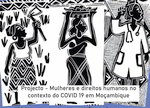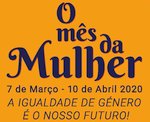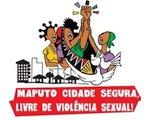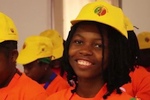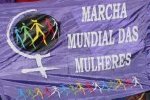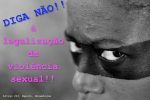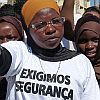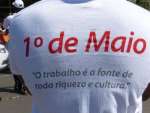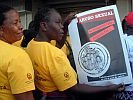Feminism and Women’s Human Rights1
Isabel Casimiro
Published in: Outras Vozes, Suplemento do boletim n° 3, July 2003
Feminist movement and Women’s organisations in Mozambique
In Mozambique, voices are becoming louder in reaction against the sharpening of social inequalities, the polarisation of income, war, corruption, lack of transparency, the ecological crisis, discrimination based on sex, skin colour, religion, ethnic group, in short against a future for new generations that is under threat.
The question of social integration – more justice and equality, more material well-being, greater democratic freedoms, more information, greater equality of opportunity and of rights for all women and all men – is also felt in Mozambique. Those who think otherwise, just because they don’t see it expressed, are deceiving themselves. Social integration should be understood as solidarity, interdependence, respect for cultural diversity, tolerance for different life styles, and giving value to democratic and participatory systems.
Today’s researchers and stakeholders, in questioning the alternatives to our daily lives, indicate as potentially liberating the deeds not done and the alternatives silenced in the south, in relation to the universalist development project. Corinne Kumar-D’Souza speaks of the “South as the visions of women, the South as the discovery of new paradigms…seeking a new language to describe what is understood … the South as the recovery of other cosmologies, as the discovery of other knowledge that was hidden, submerged, silenced. The South as an ”uprising of subjugated knowledge” wherever it may exist”. This gaze upon what was not allowed to exist, would be in the sense of completing one of the fundamental pillars of modernity, that of liberation, delayed since the 16th century by that of technological modernisation.
The perspective of struggling for women’s liberation has been present at various, separate epochs in the history of humanity. As a social movement, Feminism arose at the end of the 19th century, showing a collective will to fight against the specific oppression experienced by women. Sharing the same willingness to fight against the oppression of and discrimination against women, feminist movements spread across the world. They developed a variety of tendencies but with one common objective – to fight against the specific expression that women lived through merely because they were women.
Also in Mozambique the struggle is fought for the right to a human and dignified existence based on better living conditions. In this part of Africa, the individualism of the neo-liberal project has not yet completely corroded individual and collective relations between citizens. There still persist forms of solidarity, of mutual aid, of passive resistance. Forms that have often been silently protected and preserved by women.
From the late 1980s, but particularly from the 1990s, our country has experienced an explosion of voluntary non-governmental associations. Their creation, particularly after the approval of the country’s second Constitution in November 1990, which enshrines the right to association in Article 76, and after the approval of Law no. 8/91 on associations, is related to other aspects of Mozambican history, particularly over the past four decades.
But it is also related to the series of socio-economic changes which have occurred with the triumph of neo-liberal policies in the West, and their imposition on the countries of the periphery of the world-system, often via democratic transitions and structural adjustment programmes, which tried and continue to try to weaken the state, presenting the Market as a new God.
MULEIDE was the first women’s human rights organisation set up in Mozambique. There followed the Women’s Forum, the Association of Women Jurists, the Mozambican Women and Education Association, and many others.
Let us analyse this first organisation for the human rights of women, MULEIDE, the creation of which resulted from combined national and regional efforts, as from the early 1990s. It involved jurists from the various sectors of the administration of justice, and social scientists from the Women and Gender Studies Department, of the African Studies Centre of the Eduardo Mondlane University.
The appearance in 1990 in Harare of WILDAF (Women in Law for Development in Africa), an African organisation for the defence of women’s rights, and of WLSA (Women and Law in Southern Africa Research Trust), a regional and comparative research project, initially involving six southern African countries2, were factors that later stimulated the creation of MULEIDE. Mozambican jurists and social scientists concerned with the human rights of women, have participated in the two African organisations ever since their creation. In the 1990s, the WLSA project and other research projects in Mozambique undertook a series of activities of participatory research, which encouraged debates on the human rights of women, on social dynamics and gender relations, on feminist and women’s movements, and also on the production of national knowledge. This process also led to the appearance of other women’s associations, many of which are today an integral part of the Women’s Forum network of organisations.
Domestic violence as a Violation of the Human Rights of Women
The activities of MULEIDE began in Benfica neighbourhood, in Maputo city’s Fifth Urban District, with the training and work of activists and social assistants, in the areas of preventing sexually transmitted diseases and HIV/AIDS, legal education, education on human rights, and counselling and accompanying the victims of domestic violence. Since 1990, Benfica has been one of the study areas for the WLSA research project. This approximation between WLSA (an academic research project) and MULEIDE (a civil society association) has right from the start been at the root of the successes of both organisations.
The research/action combination has made it possible to identify the obstacles, or simple difficulties, faced by women in exercising their rights and carrying out their activities, at local level and at the level of the institutions of the administration of justice. The first activities of MULEIDE, based on the results of the WLSA project research, was the registration of births and marriages, together with the institutions of justice, in order to guarantee, when necessary, the right to maintenance and inheritance rights3.
MULEIDE’s participation in the group “All against Violence”, which arose after the United Nations Conference on Women, held in Beijing in 1995, its work together with like-minded associations in publicising women’s rights, in legal assistance to the poorest strata, and participation in revoking old and drawing up new laws has allowed it to bring to the fore the legal questions which affect various groups of women, and has been an indicator for holding several activities in order to solve them.
We should stress MULEIDE’s participation in the Women’s Forum, in the discussion of the “Declaration of Principles against Acts of Domestic Violence”, presented to the public on 4 October 2000, in Maputo, at the time of the World Women’s March against Poverty and Violence; a working group to draw up a bill against acts of domestic violence; and the new Family Law, which recently passed its first reading in parliament, after years of waiting.
It’s important to continue climbing the rope
For those who had the privilege of participating in the creation of the Department of Women’s and Gender Studies, of the WLSA Research Project, of MULEIDE and of the Women’s Forum, in the early 1990s, the challenges were huge. Indeed there were even some of us who did not believe in these alternatives. But it was worthwhile.
More than 10 years have passed, and national knowledge has been produced, based on the research carried out. Dialogue has been held with various sectors of society, work has been undertaken on improving people’s living conditions, new problematics have been focused upon, and taboos have been faced.
And while a decade is a very short time in the life of an organisation, what seems important to hold onto is that during this short time, expressions of solidarity have arisen, as have possibilities and spaces for work, study and reflection, for dialogue between various sensitivities, for the production of national knowledge and – “.. a new language to describe what is perceived”. But above all, a new awareness and new social practices which in the end are expressions of an active citizenship made available to Mozambican women.
It is important to continue “to climb the rope”, engendering new paths, improving our solidarity and our critical and voluntary participation, making struggles visible that were previously silent.
Increasingly women are beginning to drop their fear of being subversive. And so they go about building alternatives to political patterns of exclusion, and declare that they too have the right to citizenship.
Notes:
- Based on a previous text entitled “Are women citizens ?”, for the magazine Agora, No 8, February 2001, pp. 36-37, Maputo.
- Today WLSA involves seven southern African countries – Botswana, Lesotho, Malawi, Mozambique, Swaziland, Zambia and Zimbabwe – Malawi was the latest to join.
- Which were the first topics for WLSA research between 1990-94.
References:
Casimiro, Isabel (1999). “’Paz na Terra Guerra em Casa’. Feminismo e Organizações de Mulheres em Moçambique”. Thesis for a masters degree, Economics Faculty, University of Coimbra, Coimbra.
De Oliveira, Rosiska Darcy (1991). Elogio da Diferença. O Feminino Emergente. Editora Brasiliense, 2nd edition, S. Paulo.
Santos, Boaventura S. (1989). “Os Direitos Humanos na Pós-Modernidade”. In: Direito e Sociedade, Coimbra, pp. 3-12.







 Information in English
Information in English